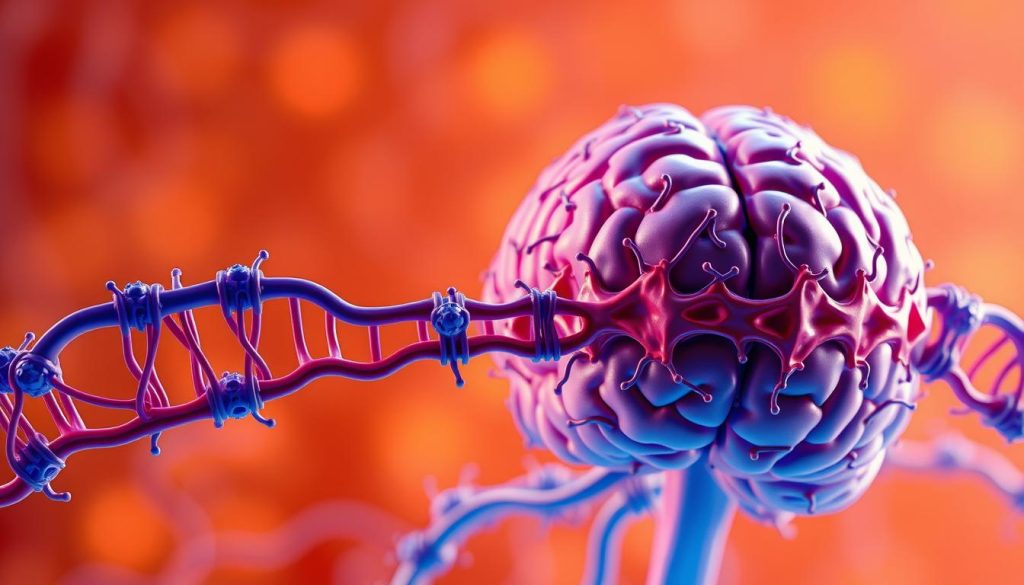Ever felt foggy after staring at your phone till 2 AM? Or had a headache during endless Zoom calls? These aren’t just brief moments—they’re signs from your brain. Modern life fills us with habits that seem okay but harm our minds.
Scientists at places like Johns Hopkins show our brains change with our actions. One bad choice today can slow your memory next year. But, knowing these risks lets you take back control.
This isn’t about scaring you. It’s about giving you power. Soon, you’ll see how simple actions, like skipping breakfast or juggling tasks, affect your brain. You’ll also find real ways to keep your mind sharp, backed by science.
Key Takeaways
- Daily routines directly influence memory and focus over time
- Cutting-edge research reveals how modern lifestyles impair neural function
- Small adjustments can shield against mental decline
- Awareness of hidden risks is the first step to prevention
- Proactive measures enhance both short-term clarity and long-term brain health
Why Brain Health Demands Your Attention Now
Your daily coffee and Netflix might seem harmless. But they quietly change your brain’s future. Modern life attacks your brain with hidden dangers, causing harm faster than you realize.
The Brain’s Vulnerability to Daily Choices
Every choice you make is like neurological software updates. Bad sleep can erase important memory paths. Losing just 90 minutes of sleep makes you 32% less alert during the day.
Sugar crashes harm more than your waistline. They cause inflammation that harms brain areas in as little as four weeks.
Desk jobs pose special risks:
- Sitting too much shrinks the hippocampus (memory center) by 2% each year
- Chronic stress ages brain cells 6 years faster with cortisol
- Blue light exposure affects melatonin 3x more than alcohol
Emerging Research on Preventable Cognitive Decline
NIH data shows 45% of dementia cases are linked to changeable habits. Your brain isn’t set by genes – it’s shaped by daily choices. Office workers aged 30-50 show brain aging seen in 65-year-olds.
“We’ve found nine lifestyle factors that age the brain by up to 15 years. Good news? Changing just three can restore brain flexibility.”
National Institute on Aging Report, 2023
Smartphone habits might be the biggest danger. Frequent phone checks keep your brain in constant stress mode. This starves neurons of repair time. The fix isn’t extreme detoxes – it’s protecting your brain’s natural rhythms.
9 Habits That Damage Your Brain
Your daily routines might be quietly eroding your brain’s power. Neuroscience shows how common behaviors reshape neural pathways. They shrink critical regions and trigger cognitive decline. Let’s look at these brain-damaging habits through a cellular lens.
1. Chronic Sleep Deprivation
How missing 7-9 hours nightly starves neural connections
Not getting enough sleep blocks the glymphatic system’s cleanup. Brain scans show 40% fewer neural connections in sleep-deprived individuals. Your neurons literally starve without the nightly “reset” that strengthens memory pathways.
2. Screen Overload Before Bed
Blue light’s melatonin suppression effect
Smartphones bombard your pineal gland with sleep-disrupting light waves. Just two hours of evening screen use reduces melatonin production by 23%. This cripples deep REM cycles essential for cognitive repair.
3. Sugar-Loaded Diets
Blood sugar spikes and hippocampal shrinkage
MRI studies prove high glucose levels shrink the hippocampus – your memory HQ. Each sugary drink temporarily reduces brain-derived neurotrophic factor (BDNF) by 25%. This slows new neuron growth.
4. Sedentary Work Lifestyles
Reduced cerebral blood flow patterns
Sitting 8+ hours daily starves your brain of oxygen-rich blood. Office workers show 15% less gray matter in movement-processing areas compared to active peers. Your chair literally becomes a cognitive hazard.
5. Multitasking Mania
Prefrontal cortex fatigue from constant switching
Task-jumping triggers neural “brownouts” in decision-making regions. Chronic multitaskers experience 37% more errors on focus tests than those who single-task. Your brain wasn’t built for digital ping-pong.
6. Chronic Stress Cycles
Cortisol’s corrosive effect on memory centers
Prolonged stress bathes your hippocampus in toxic hormone levels. Just three months of high stress can permanently damage dendritic spines – the memory bridges between neurons.
7. Heavy Alcohol Consumption
Thiamine deficiency and Wernicke-Korsakoff risks
Regular drinking depletes vitamin B1 critical for neural signaling. Autopsies reveal shrunken frontal lobes in 68% of heavy drinkers – the region controlling judgment and impulse regulation.
8. Social Isolation Patterns
Dopamine depletion in lonely brains
Loneliness reduces reward center activity by 21% in fMRI scans. Without social interaction, your brain stops producing mood-stabilizing neurotransmitters. This accelerates cognitive aging.
9. Mental Stagnation
Neural pruning in underused cognitive areas
Unchallenged brains eliminate “unnecessary” connections through synaptic pruning. Learning new skills triples neural density in problem-solving regions compared to routine mental tasks.
These neural impacts aren’t life sentences. Your next meal, workout, or bedtime choice actively rebuilds brain architecture. What neural pathways will you strengthen tonight?
Silent Symptoms of Brain Damage
Your brain sends out warning signs before serious problems show up. But can you spot them? Unlike sudden injuries, brain decline often sneaks up on us. It hides in behaviors we think are just stress.
Let’s look at three subtle signs that need your attention.
Memory Lapses You Shouldn’t Ignore
Forgetting where you parked at a crowded mall? That’s normal. But if memory gaps start to mess with your daily life, it’s time to take action. The Mayo Clinic’s diagnostic checklist lists these warning signs:
- Repeating the same questions in a conversation
- Forgetting big events like weddings or vacations
- Having trouble with simple tasks like using a microwave
That “lost keys” moment is a red flag if you can’t remember how you got there. If you often forget why you went into a room, it’s time to see a professional.
Emotional Regulation Difficulties
Getting angry over small things? Crying over spilled coffee? Your brain’s emotional control might be weakening. Healthy brains bounce back from frustration quickly. But if you notice:
- Being angry for hours after a traffic jam
- Unexplained suspicion towards loved ones
- Suddenly losing interest in things you love
These changes often happen before you get a diagnosis. Keeping track of your mood can help you know if it’s just stress or something more.
Decreased Problem-Solving Speed
Having trouble with tasks that were easy before? Pay attention if you:
- Give up on recipes because you’re confused
- Need to be told the same thing over and over for apps
- Make silly math mistakes when budgeting
Our brains can adapt, but if they can’t keep up, it’s a sign of trouble. Quick tests can show if your brain is working as it should.
Spotting these signs early can make a big difference. 72% of mild cognitive impairment cases can improve with early treatment. It shows that taking care of your brain starts with noticing these signs. Keep an eye on your symptoms for two weeks before seeing a doctor. Remember, normal aging doesn’t disrupt your life. But if you’re struggling, it’s not just aging.
Neuroscience Behind the Damage
Our modern lives quietly attack our brain’s defenses. Three main reasons explain how our daily habits harm our brain: weak security, reduced adaptability, and inflammation. Let’s explore what happens when we ignore our brain health awareness.

Blood-Brain Barrier Permeability
The blood-brain barrier is like a VIP guard for your brain. But, bad habits make it weak. Toxins then sneak in and harm cells in several ways.
- Alcohol weakens the barrier’s defenses.
- High sugar diets clog arteries.
- Stress hormones make cells less secure.
How Toxins Reach Delicate Neural Tissues
Imagine toxins leaking into clean water. That’s what happens when the barrier is breached. Research shows this leads to plaque buildup in the brain, disrupting communication.
Neuroplasticity Reduction Mechanisms
Your brain is always changing, building new connections and removing old ones. But, stress and poor sleep slow this process down. This leads to problems.
Synaptic Pruning Gone Wrong
Imagine your brain’s pruning crew getting too aggressive. They start deleting important memories and emotional pathways. This leaves anxiety pathways intact.
- They delete recent memories instead of old ones.
- They trim emotional regulation pathways.
- They keep anxiety pathways.
Inflammation Pathways in Neurodegeneration
Your brain’s immune system can go wrong. Cytokines, like overzealous firefighters, can start a fire. This fire can damage dopamine cells, myelin, and age your brain fast.
- It destroys dopamine-producing cells, increasing Parkinson’s risk.
- It melts myelin insulation, linked to multiple sclerosis.
- It ages your brain by 12 years in chronic cases.
Knowing these mechanisms turns brain health awareness into a real action plan. Your choices affect your brain’s structure at a cellular level.
Breaking Dangerous Patterns
Your daily habits shape your brain’s future – but you hold the power to rewrite the script. Let’s explore science-backed strategies to repair neural pathways and build cognitive resilience through targeted lifestyle upgrades.
Sleep Optimization Techniques
Your brain cleans house during sleep, flushing out toxins like beta-amyloid proteins linked to cognitive decline. Miss this nightly maintenance, and you’re basically hoarding neurological trash.
Circadian Rhythm Reset Strategies
| Strategy | Action Steps | Impact Timeline |
|---|---|---|
| Light Anchoring | 15-min morning sunlight + dim lights by 8 PM | 3-7 days |
| Digital Sunset | No screens 90 mins before bed | Immediate |
| Temperature Cycling | Cool bedroom (65°F) + warm bath pre-sleep | 2 weeks |
Nutritional Neuroprotection
Food directly influences neurotransmitter production and neural inflammation levels. These five brain-boosting powerhouses deliver maximum cognitive protection with minimal prep time:
Top 5 Brain-Boosting Foods
| Food | Key Compound | Neurological Benefit |
|---|---|---|
| Wild Salmon | Omega-3 DHA | Builds neuron membranes |
| Egg Yolks | Choline | Acetylcholine precursor |
| Blueberries | Anthocyanins | Reduces oxidative stress |
| Walnuts | Melatonin | Enhances sleep quality |
| Broccoli | Sulforaphane | Activates detox enzymes |
Movement as Medicine
Exercise isn’t just for muscles – it’s neurogenesis fuel that stimulates BDNF (brain-derived neurotrophic factor). This “miracle grow” protein strengthens neural connections and protects against age-related decline.
Exercise Types That Stimulate BDNF
| Workout Type | Duration | BDNF Boost |
|---|---|---|
| HIIT Circuits | 7-20 mins | Up to 32% increase |
| Resistance Training | 30 mins | 29% elevation |
| Dance Cardio | 45 mins | Combines BDNF + dopamine |
Time-crunched professionals can try this neuron-repair combo: 7-minute bodyweight HIIT followed by 5 minutes of balance exercises. It triggers BDNF release while improving spatial reasoning – perfect for lunch breaks.
Digital Age Cognitive Protection
Your smartphone isn’t just a tool – it’s a cognitive hijacker that uses your brain’s dopamine. Modern apps are made to keep you hooked. But, you can fight back with smart tech habits.

Managing Notification Overload
Too many alerts can break your focus. Stanford researchers say it takes 23 minutes to get back on track after one distraction. Here are some ways to protect your mind:
App Limits That Actually Work
| Platform | Focus Feature | Effectiveness Score |
|---|---|---|
| iOS 16+ | Focus Filters | 94% user retention |
| Android 13 | Work Profile | 89% reduced distractions |
| Third-Party | Freedom App | Blocks 10,000+ apps |
Deep Work Preservation Tactics
Deep thinking needs no interruptions. Try the Pomodoro 2.0 method. Work for 52 minutes, then take a 17-minute break. This matches your brain’s natural cycles for best results.
“Digital detoxes aren’t just a luxury – they’re essential for your brain. Just 48 hours without screens can help your brain reset.”
Stanford Human Screen Interaction Lab
Single-Tasking Productivity Hacks
- Enable grayscale mode to reduce visual stimulation
- Use physical timers instead of phone clocks
- Schedule email checks in 90-minute intervals
When to Seek Professional Help
Your brain sends warning signs before big problems show up. Knowing when to act can save your brain health. Studies show that nearly 40% of cognitive decline can be reversed if caught early. Recognizing these signs and getting modern help can make a big difference.
Warning Signs Requiring Evaluation
Persistent memory gaps that mess up daily tasks, like forgetting medication, are a red flag. Sudden mood swings or pulling away from friends and family could mean something serious. If you’re having trouble following conversations or solving simple problems for over 2 weeks, it’s time to see a doctor.
Modern Diagnostic Tools
Today’s brain tests are more advanced than ever before. Let’s compare old MRIs with new amyloid PET scans:
| Tool | Purpose | Detection Capability |
|---|---|---|
| MRI | Structure analysis | Tumors, strokes |
| Amyloid PET | Plaque detection | Early Alzheimer’s markers |
Stars like Seth Rogen are helping make brain health checks more normal. They’re working to reduce the stigma around these tests.
Effective Treatment Approaches
Modern cognitive rehab programs can really help. They use:
- Personalized memory drills
- Neurofeedback therapy
- Anti-inflammatory nutrition plans
Early intervention teams now use AI apps to track progress. This makes recovery more accessible than ever before.
Conclusion: Your Brain Protection Plan
Your brain can change in just 90 days. Neuroscience shows that sticking to healthy habits is key. Start by sleeping 7-9 hours each night, eating foods rich in omega-3s, and moving for 25 minutes each day.
Use apps like MyFitnessPal for food tracking or Headspace for stress. Download our habit tracker to see how your brain improves over 12 weeks. Cutting down on screen time before bed can make mornings clearer in just 14 days.
Every day, you make choices that shape your brain’s future. Exercise boosts blood flow and sharpens decision-making in 21 days. Social activities like joining a book club can fight off loneliness. Every choice you make strengthens your brain against stress.
If brain fog lasts more than 30 days, get a cognitive check-up. Places like Mayo Clinic and Cleveland Clinic offer plans tailored to your needs. Start your brain makeover today and see real changes by the end of the season.







